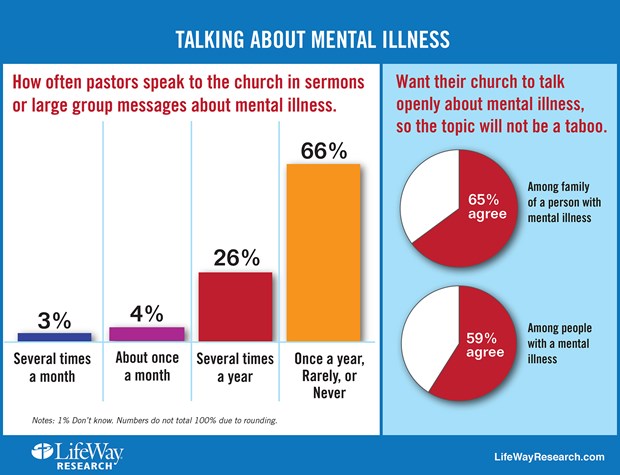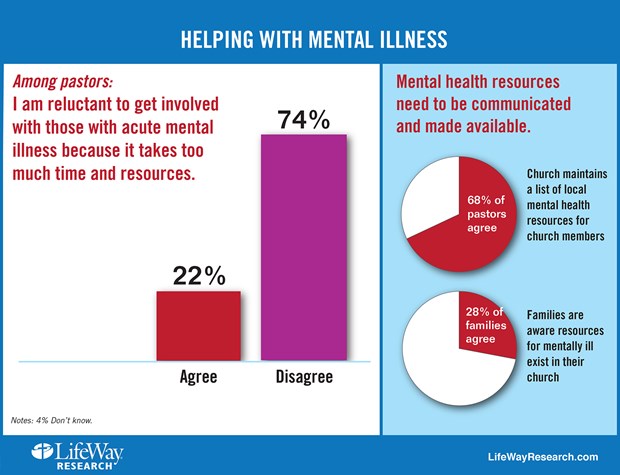1 in 4 Pastors Have Struggled with Mental Illness, Finds LifeWay and Focus on the Family

[Updated with Ed Stetzer quotes]
Your pastor is just as likely to experience mental illness as any other American, according to a LifeWay Research survey commissioned by Focus on the Family.
Nearly 1 in 4 pastors (23 percent) acknowledge they have “personally struggled with mental illness,” and 12 percent of those pastors said the illness had been diagnosed, according to the poll (infographics below). One in four U.S. adults experience mental illness in a given year, according to the National Alliance on Mental Illness.
Recent deaths by suicide of high-profile pastors’ children, including Rick Warren’s son Matthew and Joel Hunter's son Isaac, have prompted increased attention to mental illness from pastors’ pulpits and pens. Warren launched “The Gathering on Mental Health and the Church” this past spring. High-profile pastors, including NewSpring Church pastor Perry Noble, have publicly documented their struggles with mental illness.
“Here’s what we know from observation: If you reveal your struggle with mental illness as a pastor, it’s going to limit your opportunities,” Ed Stetzer, executive director of LifeWay Research, told CT. “What happens is pastors who are struggling with mental illness tend not to say it until they are already successful. So Perry Noble, running a church of 30,000 plus, just last year says ‘I have severe depression.’”
“We have to break the stigma that causes people to say that people with mental illness are just of no value,” he added. “These high-profile suicides made it okay to talk about, but I think Christians have been slower than the population at large to recognize what mental illness is, let alone what they should do."
The majority of pastors (66 percent) still rarely or never talk about mental illness in sermons or before large groups, the survey found. About one-fourth of pastors bring up mental illness several times a year, and 7 percent say they tackle it once a month or more.
 Image: LifeWay Research
Image: LifeWay ResearchStruggling laypeople wish their churches dealt with the issue more; 59 percent of respondents with a mental illness want their church to talk more openly about it, as do 65 percent of their family members.
“Our research found people who suffer from mental illness often turn to pastors for help,” Stetzer noted in a news release. “But pastors need more guidance and preparation for dealing with mental health crises. They often don’t have a plan to help individuals or families affected by mental illness, and miss opportunities to be the church.”
Other “key disconnects” uncovered by the study:
- Two-thirds of pastors (68 percent) say their church maintains a list of local mental health resources for church members. But few families (28 percent) are aware those resources exist.
- Only a quarter of churches (27 percent) have a plan to assist families affected by mental illness, according to pastors. And only 21 percent of family members are aware of a plan in their church.
- Few churches (14 percent) have a counselor skilled in mental illness on staff, or train leaders how to recognize mental illness (13 percent), according to pastors.
The disconnect isn’t because of a lack of compassion. Most pastors (74 percent) say they aren’t reluctant to get involved with those with acute mental illnesses, and nearly 60 percent have provided counseling to people who were later diagnosed.
 Image: LifeWay Research
Image: LifeWay ResearchInstead, pastors can feel overwhelmed at times with how to properly respond to the mental health needs of members of their congregation; 22 percent said they were reluctant to do more because it took “too much time.”
“Pastors are trained for spiritual struggle. They’re not trained for mental illness,” Stetzer told CT. “And so, what they will often do is pass someone off. I don’t think what that 20 percent says is ‘Forget you,’ but ‘I can’t handle this.’”
The silence at church can lead to a reluctance to share, Atlanta-based psychiatrist Michael Lyles told LifeWay. “The vast majority of [my evangelical Christian patients] have not told anybody in their church what they were going through, including their pastors, including small group leaders, everybody,” he said in the release.
In fact, 10 percent of the 200 respondents with mental illness said they have switched churches after a church’s poor response to them, and another 13 percent stopped going altogether or couldn’t find a church.
But more than half of regular churchgoers with mental illness said they stayed where they were, and half also said that their church has been supportive. One way churches can be supportive, Stetzer suggested to CT, is regular meetings between pastoral staff and the person suffering from mental illness, even as the individual continues to receive consistent medical treatment.
“The Bible is filled with people who struggled with suicide, or were majorly depressed or bi-polar,” said Focus on the Family pyschologist Jared Pingleton in the LifeWay release. “David was totally bi-polar. Elijah probably was as well. They are not remembered for those things. They are remembered for their faith.”
Researchers focused on three groups:
They surveyed 1,000 senior Protestant pastors about how their churches approaches mental illness. Researchers then surveyed 355 Protestant Americans diagnosed with an acute mental illness—either moderate or severe depression, bipolar, or schizophrenia. Among them were 200 church-goers.
A third survey polled 207 Protestant family members of people with acute mental illness.
Researchers also conducted in-depth interview with 15 experts on spirituality and mental illness.
LifeWay's full release is copied below.
CT frequently addresses mental health, including how pastors can guard against mental illness, the spiritual side of mental illness, how Facebook can affect your mental health, and how nothing, not even suicide, can separate people from the love of God. CT also covered Saddleback Church senior pastor Rick Warren’s mental health ministry launch after his son Matthew took his own life in 2013.
-----
Mental Illness Remains Taboo Topic for Many Pastors
By Bob Smietana
NASHVILLE, Tenn. – One in four Americans suffers from some kind of mental illness in any given year, according to the National Alliance on Mental Illness. Many look to their church for spiritual guidance in times of distress.But they're unlikely to find much help on Sunday mornings.
Most Protestant senior pastors (66 percent) seldom speak to their congregation about mental illness.
That includes almost half (49 percent) who rarely (39 percent) or never (10 percent), speak about mental illness. About 1in 6 pastors (16 percent) speak about mental illness once a year. And about quarter of pastors (22 percent) are reluctant to help those who suffer from acute mental illness because it takes too much time.
Those are among the findings of a recent study of faith and mental illness by Nashville-based LifeWay Research. The study, co-sponsored by Focus on the Family, was designed to help churches better assist those affected by mental illness.
Researchers looked at three groups for the study.
They surveyed 1,000 senior Protestant pastors about how their churches approaches mental illness. Researchers then surveyed 355 Protestant Americans diagnosed with an acute mental illness—either moderate or severe depression, bipolar, or schizophrenia. Among them were 200 church-goers.
A third survey polled 207 Protestant family members of people with acute mental illness.
Researchers also conducted in-depth interview with 15 experts on spirituality and mental illness.
The study found pastors and churches want to help those who experience mental illness. But those good intentions don’t always lead to action.
"Our research found people who suffer from mental illness often turn to pastors for help," said Ed Stetzer, executive director of LifeWay Research.
"But pastors need more guidance and preparation for dealing with mental health crises. They often don’t have a plan to help individuals or families affected by mental illness, and miss opportunities to be the church."
A summary of findings includes a number of what researchers call ‘key disconnects’ including:
Only a quarter of churches (27 percent) have a plan to assist families affected by mental illness according to pastors.And only 21 percent of family members are aware of a plan in their church. Few churches (14 percent) have a counselor skilled in mental illness on staff, or train leaders how to recognize mental illness (13 percent) according to pastors. Two-thirds of pastors (68 percent) say their church maintains a list of local mental health resources for church members. But few families (28 percent) are aware those resources exist. Family members (65 percent) and those with mental illness (59 percent) want their church to talk openly about mental illness, so the topic will not be a taboo. But 66 percent of pastors speak to their church once a year or less on the subject.That silence can leave people feeling ashamed about mental illness, said Jared Pingleton, director of counseling services at Focus on the Family. Those with mental illness can feel left out, as if the church doesn’t care. Or worse, they can feel mental illness is a sign of spiritual failure.
"We can talk about diabetes and Aunt Mable’s lumbago in church—those are seen as medical conditions,” he said. “But mental illness--that’s somehow seen as a lack of faith."
Most pastors say they know people who have been diagnosed with mental illness. Nearly 6 in 10 (59 percent) have counseled people who were later diagnosed.
And pastors themselves aren’t immune from mental illness. About a quarter of pastors (23 percent), say they’ve experienced some kind of mental illness, while 12 percent say they received a diagnosis for a mental health condition.
But those pastors are often reluctant to share their struggles, said Chuck Hannaford, a clinical psychologist and president of HeartLife Professional Soul-Care in Germantown, Tennessee. He was one of the experts interviewed for the project.
Hannaford counsels pastors in his practice and said many – if they have a mental illness like depression or anxiety—won’t share that information with the congregation.
He doesn't think pastors should share all the details of their diagnosis. But they could acknowledge they struggle with mental illness.
"You know it’s a shame that we can’t be more open about it,” he told researchers. “But what I’m talking about is just an openness from the pulpit that people struggle with these issues and it’s not an easy answer."
Those with mental illness can also be hesitant to share their diagnosis at church. Michael Lyles, an Atlanta-based psychiatrist, says more than half his patients come from an evangelical Christian background.
"The vast majority of them have not told anybody in their church what they were going through, including their pastors, including small group leaders, everybody," Lyle said.
Stetzer said what appears to be missing in most church responses is "an open forum for discussion and intervention that could help remove the stigma associated with mental illness."
"Churches talk openly about cancer, diabetes, heart attacks and other health conditions – they should do the same for mental illness, in order to reduce the sense of stigma," Stetzer said.
Researchers asked those with mental illness about their experience in church.
A few – (10 percent)—say they’ve changed churches because of how a particular church responded to their mental illness. Another 13 percent ether stopped attending church (8 percent) or could not find a church (5 percent). More than a third, 37 percent, answered, “don’t know,” when asked how their church’s reaction to their illness affected them. Among regular churchgoers with mental illness, about half (52 percent) say they have stayed at the same church. Fifteen percent changed churches, while 8 percent stopped going to church, and 26 percent said, “Don’t know.” Over half, 53 percent, say their church has been supportive. About thirteen percent say their church was not supportive. A third (33 percent) answered, “don’t know” when asked if their church was supportive.LifeWay Research also asked open-ended questions about how mental illness has affected people’s faith. Those without support from the church said they struggled.
“My faith has gone to pot and I have so little trust in others,” one respondent told researchers.
“I have no help from anyone,” said another respondent.
But others found support when they told their church about their mental illness.
“Several people at my church (including my pastor) have confided that they too suffer from mental illness,” said one respondent. “Reminding me that God will get me through and to take my meds,” said another.Mental illness, like other chronic conditions, can feel overwhelming at times, said Pingleton. Patients can feel as if their diagnosis defines their life. But that’s not how the Bible sees those with mental illness, he said.
He pointed out that many biblical characters suffered from emotional struggles. And some, were they alive today, would likely be diagnosed with mental illness.
“The Bible is filled with people who struggled with suicide, or were majorly depressed or bi-polar, he said. “David was totally bi-polar. Elijah probably was as well. They are not remembered for those things. They are remembered for their faith.”
LifeWay Research’s study was featured in a two-day radio broadcast from Focus on the Family on September 18 and 19. The study, along with a guide for pastors on how to assist those with mental illness and other downloadable resources, are posted at ThrivingPastor.com/MentalHealth.
LifeWay Research also looked at how churches view the use of medication to treat mental illness, about mental and spiritual formation, among other topics. Those findings will be released later this fall.
Methodology:
LifeWay Research conducted 1,000 telephone surveys of Protestant pastors May 7-31, 2014. Responses were weighted to reflect the size and geographic distribution of Protestant churches. The sample provides 95% confidence that the sampling error does not exceed +3.1%. Margins of error are higher in sub-groups.LifeWay Research conducted 355 online surveys July 4-24, 2014among Protestant adults who suffer from moderate depression, severe depression, bipolar, or schizophrenia. The completed sample includes 200 who have attended worship services at a Christian church once a month or more as an adult.
LifeWay Research conducted 207 online surveys July 4-20, 2014 among Protestant adults who attend religious services at a Christian church on religious holidays or more often and have immediate family members in their household suffering from moderate depression, severe depression, bipolar, or schizophrenia.





























































































































